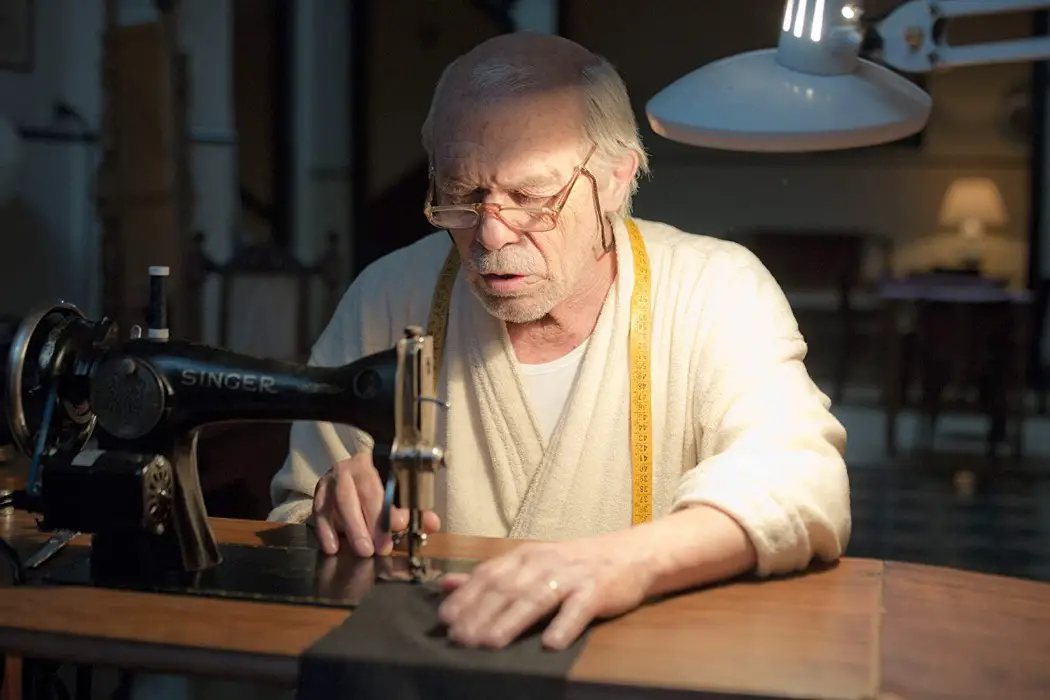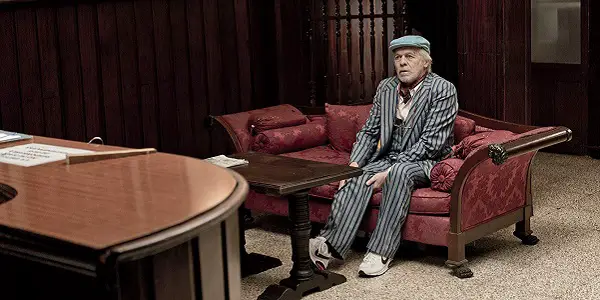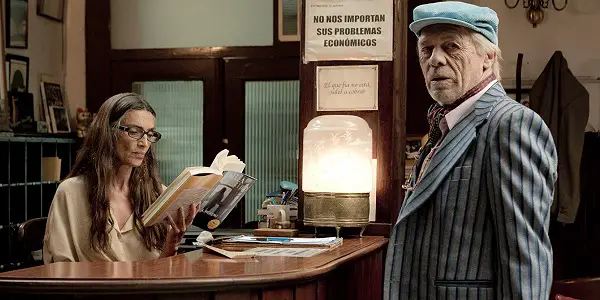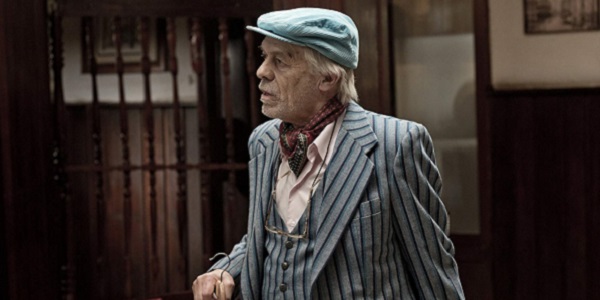THE LAST SUIT: A Powerful & Poignant Journey

Lee Jutton has directed short films starring a killer toaster,…
Written and directed by Argentine filmmaker Pablo Solarz, The Last Suit is a lovely little movie about one man’s attempt to reconcile with his past at the end of his life. An unusual, beautiful fusion between a road movie and a war movie, it tells the story of an elderly Holocaust survivor’s determination to return to his homeland and track down the man who saved his life so many years ago. In order to succeed, he’ll have to summon all of his strength to face his memories of that terrible time head on and accept a bit of help from strangers along the way.
Journey to the Past
Abraham Bursztein (Miguel Ángel Solá) survived imprisonment in Auschwitz during World War II and escaped to Argentina with the help of his close friend, Piotrek. In the seventy or so years that have passed since, Abraham has worked as a tailor in Buenos Aires, raised a large family, and totally lost touch with the man that saved his life. But now that he is approaching the age of 90 and looking at spending his remaining days confined to a nursing home, Abraham is embarking on the reverse of his post-war escape and returning to Poland, where he hopes to find Piotrek and gift him the last suit he’ll ever make.

Needless to say, it isn’t easy for an 88-year-old man (with a bad leg that many doctors insist may have to be amputated) to escape the clutches of his family and embark on a journey to a country halfway around the world of which he refuses to speak the name, stubbornly holding up a piece of paper with “Polonia” written on it to anyone who asks him of his destination. (“I don’t use bad words,” Abraham says.) But, despite – or perhaps because of – his advanced age, Abraham refuses to give up.
First, he flies to Madrid, where he befriends a woman with a tangled past of her own who runs a hostel and attempts to reconcile with an estranged daughter who was essentially the Cordelia to his King Lear. From there, Abraham takes a train to Paris and nearly flies off the rails when he learns there is no way to reach Poland without passing through Germany, a country he still hates for obvious reasons despite one kindly German woman’s attempt to express her nation’s guilt and shame to him. The emotional and physical weight of the journey grow the closer Abraham gets to Poland — and hopefully, Piotrek. But will his friend even still be there by the time he arrives?
Life After Tragedy
A roguishly charming man with an old-fashioned sense of manners and impeccable style, Abraham is a magnetic protagonist who you’ll be happy to join on his journey. Miguel Ángel Solá infuses the role with equal parts strength and vulnerability, reflecting both Abraham’s determination to complete his journey and his inner terror that he won’t be able to do so.

His behavior is often frustrating, especially in regards to his treatment of estranged daughter Claudia, but one can sense where it comes from inside this troubled man and empathize, even if you don’t agree. And despite being remarkably set in his ways and behaviors, Abraham does evolve with each new encounter along his journey.
Beautiful cinematography by Juan Carlos Gómez and a klezmer-heavy musical score courtesy of composer Federico Jusid accentuate the bittersweet flavor of The Last Suit. Flashbacks of Abraham’s wartime life in Poland are handled with elegance and tact by Solarz, conveying the horror and heartbreak of Abraham losing his entire family, including his charming little sister, during the Holocaust without subjecting the audience to the kinds of graphic imagery one is used to encountering in these kinds of movies.
To hear Abraham angrily tell the German woman he meets of the supposed “crimes” that earned his Jewish family bullets in the head, decades of suppressed rage against an entire country bubbling to the surface, is far more impactful than simply showing the executions as they happened. The before and the after of the tragedy are given much more screen time and the stark contrast between the two hits hard.

The various characters that Abraham meets along his journey are interesting in their own rights, though his interactions with them often stretch the boundaries of credibility. Perhaps I am just too cynical to believe that so many strangers would be willing to not only help this man on his seemingly impossible quest but to reveal so much of themselves in the process. Whether you find these meetings believable or not, they will tug at your heartstrings and give you a little more faith in humanity — something all too necessary in these troubled times.
The Last Suit: Conclusion
Impeccably crafted and effectively acted, The Last Suit is a poignant reminder of the importance of not going to one’s grave with any regrets. By elegantly twisting the tropes of both the road movie and the war movie, it tells a story that feels refreshing even when it dwells on historical events we’ve heard about so many times before.
What do you think? Does The Last Suit sound unlike other stories of the Holocaust you’ve heard before? Share your thoughts in the comments below.
The Last Suit will be released in the U.S. on September 21, 2018. You can find more international release dates here.
Does content like this matter to you?
Become a Member and support film journalism. Unlock access to all of Film Inquiry`s great articles. Join a community of like-minded readers who are passionate about cinema - get access to our private members Network, give back to independent filmmakers, and more.
Lee Jutton has directed short films starring a killer toaster, a killer Christmas tree, and a not-killer leopard. Her writing has appeared in publications such as Film School Rejects, Bitch: A Feminist Response to Pop Culture, Bitch Flicks, TV Fanatic, and Just Press Play. When not watching, making, or writing about films, she can usually be found on Twitter obsessing over soccer, BTS, and her cat.













